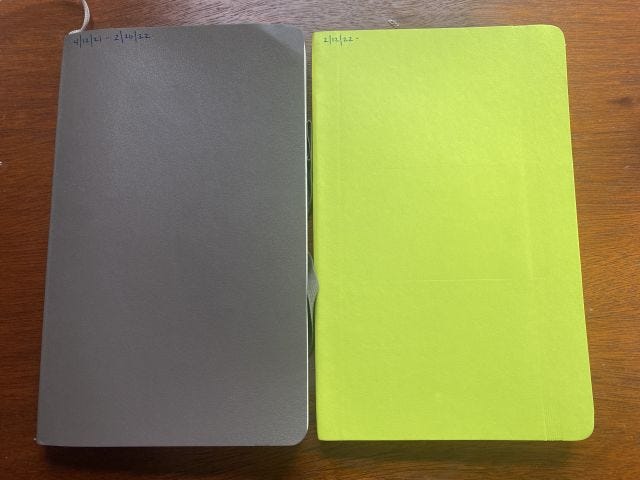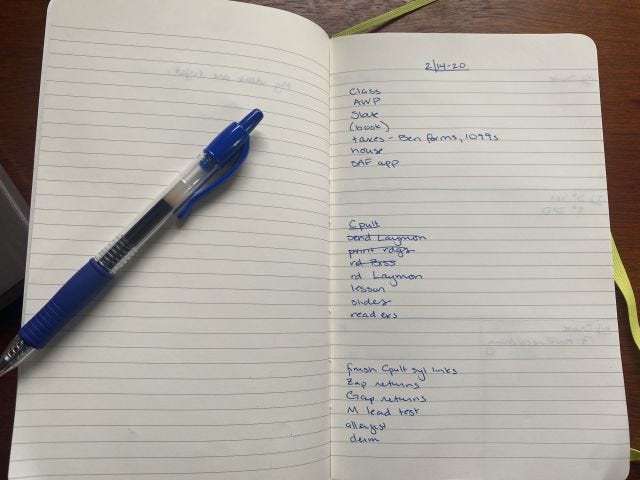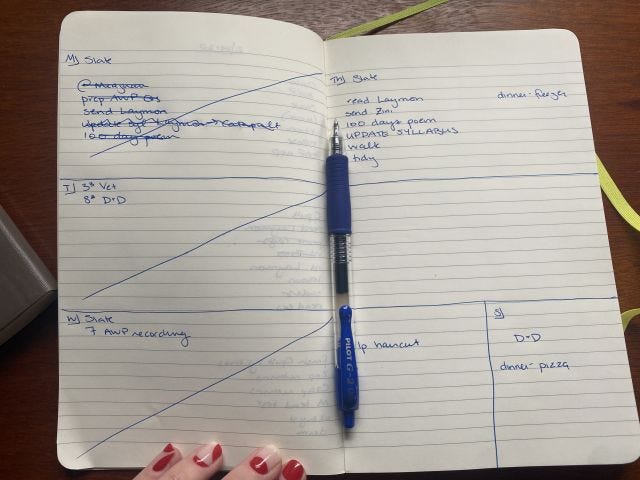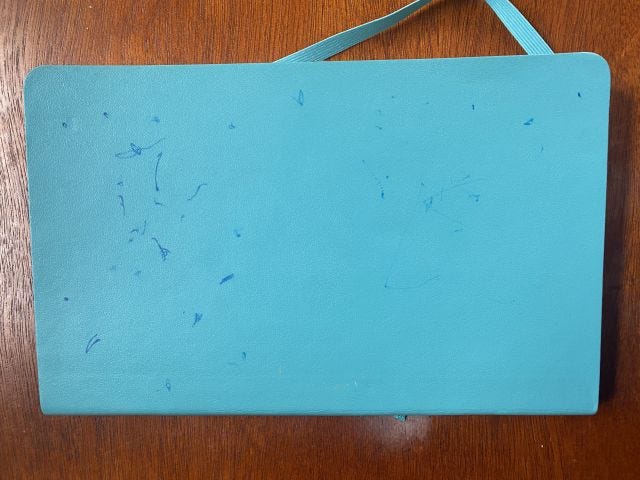It's new notebook day! Happy new notebook day to all who celebrate, which today is probably just me, because it's not a new year or anything, just a random Thursday in February, but it's the day (or the week) my old notebook ran out, and my new notebook arrived, so this morning I happily copied over the last week's notes and took a little picture of them side-by-side.

Notebooks are a fraught topic for writers, and for any adult who misses the rush of fresh school supplies. Every September and January, it seems, they bubble up in the discourse again. And it's usually with self deprecation: Surely *this* new notebook will solve all my problems, surely I won't abandon it ten pages in. Surely I won't be so intimidated by its pristine pages and uncracked spine that I won't avoid it altogether.
My notebooks aren't elegant or fancy—though I'm really taken with the acid green of my latest acquisition—but I use the hell out of them. I'm not a naturally organized or focused person, but my notebook helps me be a little more of both. So in case this might be useful to you, here's how.
I didn't invent any of this, but adapted it from two main sources: Getting Things Done, the get-organized bible aimed at CEOs and businessmen but admittedly full of useful advice; and Merlin Mann, coiner of "inbox zero" and of what has become my notebook mantra. But more on the mantra in a moment.
The main elements I kept from Getting Things Done are: writing everything down; planning at various scales. Writing everything down (and it's crucial corollary: putting it somewhere you can find it) seems obvious, right? Don't count on yourself to remember things. I forget lots of things. But even if you don't, even if your mind is an iron lockbox instead of a sieve, think of how heavy that lockbox is. All the work you're doing remembering your to-dos and appointments? Put that effort elsewhere, to imagining or resting or any of the millions of things the pages of a notebook can't do. But a notebook is very good at remembering.
Then there are the scales. This just means having to-do lists for the day, week, and sometimes month, as well as carrying over vaguer, bigger-picture tasks and goals. At some point I need to call Miles's allergist. Not necessarily this week, but I don't want to totally forget about it either. So I figured out a way to track all of that.
Here's what this looks like. It's basically a self-drawn planner, but I like drawing it myself because doing so, and copying my appointments from google calendar and assigning to-dos to various days, is a chance to check in with what's coming for the week.

First, the page for the week. Top left is my active projects for the week. (If a project is dormant, or coming soon, it either goes in parentheses or a separate list.) Some weeks this list is shorter than others. But even if a project doesn't have specific to-dos, this keeps it present in my mind.
Below that I've listed the tasks I have to do at some point this week for my Catapult class, and below that the lingering do-these-eventualies. Has this list been copied over from week to week with almost no activity? Yes. Will I eventually return those shoes to Zappos? Probably.
Sometimes I also list my rough meal plan for the week somewhere on the right.
Then I turn the next two-page spread into a planner. A box for every day, little boxes for the weekend. Copy out appointments from my calendar (and mark the days I'm doing my Slate shifts), and then to-dos for the day. Some days have lots of to-dos, some don't work as task check-off days, some days I forget to write a list out, some tasks keep getting copied over to the next day.

Okay, that's basic. That's a planner. But the real innovation for me, the thing that makes me love my notebooks (and that makes them so much more than hand-drawn planners!) is what I heart Merlin Mann say of his own notebooks years and years ago on a podcast: Nothing doesn't go in the notebook.
This is brilliant advice, because it's practical and philosophical. Practically: The notebook is a catch-all for everything you need to keep. In addition to my planner pages (and sometimes I'll sketch out the next dozen or so weeks for a more zoomed-out view of my work) the brown notebook I'm retiring included: math scratch paper, lists of self-care activities, recipes, dinner orders, the list of documents needed for new passports, meeting plans, interview notes, phone call notes, etc etc etc. Everything that I have to write down and keep somewhere, this is where. So then, when I'm looking for a confirmation number or whatever, I just have to flip through one notebook. When I'm looking for something I've written down sometime in the last five years, I just have to flip through seven notebooks.
Then there is the philosophy: Nothing doesn't go in the notebook. If everything can go in the notebook, then a notebook cannot be ruined. A notebook isn't precious or pristine anymore. It can have doodles and cross-outs and wasted pages. A page that's half a to-do list and half jotted down figures for quarterly taxes? Fantastic. Not only okay but encouraged. It's neither messy nor neat, it's just... everything. There is nothing here to mess up.
Of course, I've broken my own rule in one major way: I have one notebook for everything. And I have another notebook for everything to do with my book. (Have I accidentally taken notes on a book-related call in my main notebook? Yes. Is that okay? Everything is okay!) So that blue notebook is "Nothing about the book doesn't go in the notebook." Schedules, notes, ideas, feedback, outlines, to-dos, little post-it notes with the first drafts of illustrations—everything. But it felt important to me to give the book its own space. In part but not entirely because in the time I've been writing my book I've gone through three main notebooks, and I want the book stuff all in one place. (Three years in and it's about 3/4 full.)
At some point about a year ago, when Miles was in his tiny-runes phase of art, he christened my book notebook thusly, making it extra precious to me.

So that's my notebooks! I love them and they work well for me, and maybe something I've said here will work well for you, too.


